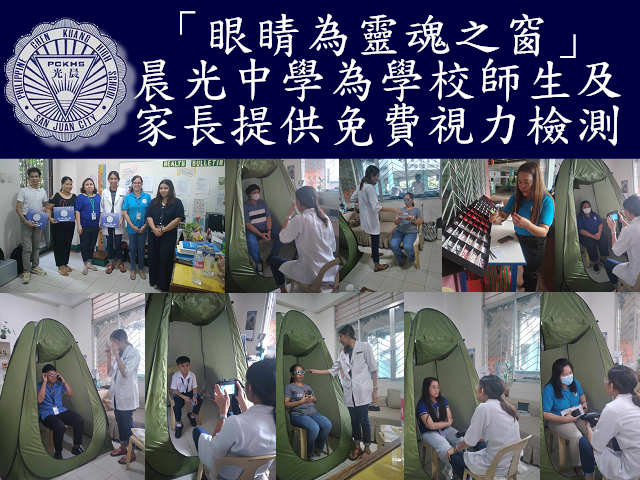Children’s visual development generally completed around the age of eight. If there are abnormalities in vision during this developmental period and they are not corrected, visual development may be impaired. In daily life, parents or caregivers may find it difficult to detect children’s vision problems. Through vision screening, we can identify children with visual abnormalities early, and arrange referrals and treatment to help with their future vision and visual development.
around the age of eight. If there are abnormalities in vision during this developmental period and they are not corrected, visual development may be impaired. In daily life, parents or caregivers may find it difficult to detect children’s vision problems. Through vision screening, we can identify children with visual abnormalities early, and arrange referrals and treatment to help with their future vision and visual development.
Our school’s health office invites Dr. CELYN L. ARTIEDA, an eye specialist, to provide vision tests for our students on November 7th from 10:00 AM to 4:00 PM. We will also provide eyeglasses to students from financially disadvantaged backgrounds. Furthermore, free vision tests will be offered to teachers and parents in both Chinese and English.
Dr. ARTIEDA will also share some eye care tips with the students and parents who undergo vision tests, such as (1) getting enough sleep, having a balanced diet, and engaging in outdoor activities daily, (2) reading and working in well-lit environments, (3) maintaining a minimum distance of 30 cm between books and eyes while reading, (4) limiting the use of electronic screen products; children aged 2 to 5 should not use them for more than 1 hour per day, and parents should supervise usage, (5) maintaining a minimum distance of 50 cm from the eyes to computer screens, 40 cm to tablet screens, and 30 cm to smartphones when using screen products; for watching TV, the farther the better, (6) taking breaks of 20 to 30 seconds after reading, watching TV, or using screen products for 20 to 30 minutes, looking into the distance to relax the eye muscles, (7) wearing protective eyewear when engaging in ball sports, and (8) seeking advice from doctors or optometrists if there are problems with the eyes or vision.
Our school’s educational philosophy is to cultivate a healthy lifestyle to promote students’ growth. The school strongly supports the ‘Healthy School’ policy, which can enhance learning experiences and assist students in developing healthy and balanced habits, including maintaining a regular daily routine, engaging in moderate physical activity, having a balanced diet, learning self-care, maintaining personal hygiene, and ensuring mental well-being.”
If you have any specific questions or need further assistance, please let me know.


